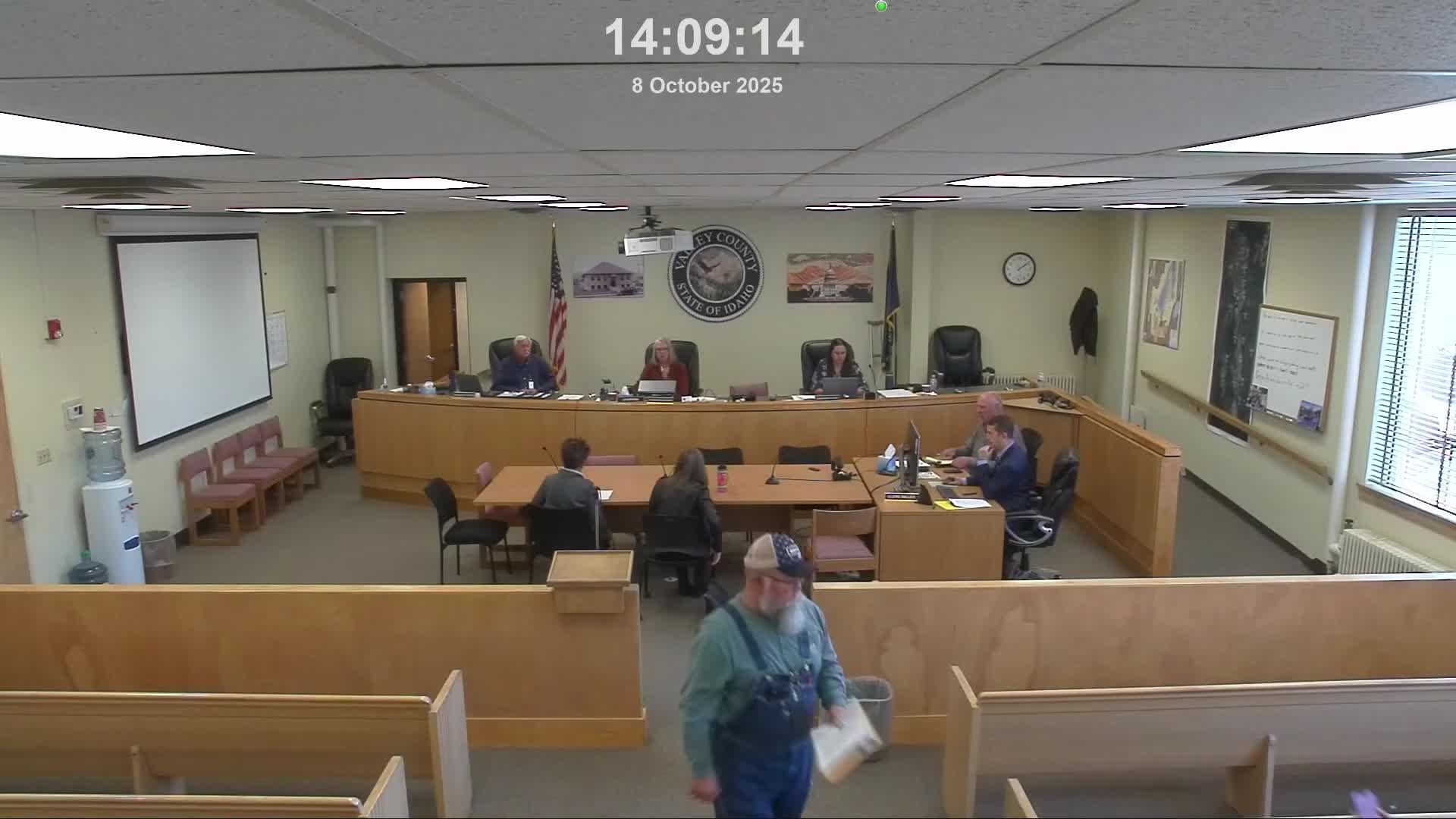Commissioners press Perpetua on housing, roads and emergency response as community development agreement is refined
Get AI-powered insights, summaries, and transcripts
Subscribe
Summary
Valley County commissioners and Perpetua representatives reviewed a proposed community development agreement for the Sibnite Gold Project, pressing the company on valley-floor housing mitigation, road impacts and emergency-response support while Perpetua reiterated on-site housing and monitoring commitments.
Valley County commissioners and Perpetua representatives met in a workshop to review a proposed community development agreement intended to memorialize mitigation commitments tied to the Sibnite Gold Project conditional use permit (CUP). Commissioners focused questions on housing impacts to the valley floor, road improvements, emergency response and reporting; Perpetua reiterated commitments to on-site worker housing, road agreements and annual or biannual reviews.
Deborah Nelson, legal counsel for Perpetua, opened with a recap of the CUP and said Perpetua's written commitments include funding, in-kind road work and a multi-year community contribution under an existing community agreement. Perpetua described the project's anticipated economic footprint, citing feasibility figures that were discussed during the meeting: construction and operational job estimates and projected tax revenue figures provided by Perpetua's finance team.
Commissioner Sherry led questioning on housing and said on-site employee housing at the mine does not by itself satisfy CUP language requiring mitigation of local community housing impacts. "I absolutely disagree that that in any way satisfies the CUP requirement for housing," Sherry said, arguing the CUP asked for mitigation in the county's communities, not only on federally managed mine-site housing. Sherry asked that Perpetua finance or fund a program to identify and mitigate valley-floor housing impacts and proposed a biannual housing-needs assessment and a "good faith" clause that would trigger mitigation measures if the county saw measurable housing pressures attributable to the project.
Perpetua told the board it will build temporary construction housing (up to about 1,280 beds during construction) and an operational housing village sized for roughly 550–600 beds at the mine site, and that most mine-site workers would travel to the site via company shuttle rather than drive individually. A Perpetua project representative said the mine is expected to generate "about 50 round trips a day on Warm Lake," with roughly 35 of those movements being trucks, a figure commissioners asked be addressed in the road maintenance agreement.
On roads, county staff said Perpetua must finalize a road development and maintenance agreement that includes repair, consolidated loads and winter plowing requirements and referenced recent road studies completed for Warm Lake Road. Parametric studies on the Warm Lake/Highway 55 intersection were discussed; transportation work by the Idaho Transportation Department is scheduled for 2027. Commissioners requested the road agreement include a look-back mechanism to track volume and incremental impacts over time.
Perpetua also proposed annual or semiannual briefings: quarterly updates during construction and semiannual meetings in operation. The draft CDA already includes cooperation language requiring the parties to meet and work in good faith to resolve issues and to consider addenda if new or additional mitigation is needed.
Emergency response and public safety featured in the discussion. Perpetua confirmed it will maintain on-site paramedic-level medical resources and offered to continue joint training with local fire and EMS agencies; Perpetua proposed a $5,000 annual contribution toward hazmat trailer maintenance and said it would reimburse documented, out-of-pocket emergency response costs attributable to project incidents beyond insurance payments. Commissioners asked for clearer, written requests from the sheriff and fire districts that identify the resources they would need.
Commissioners also discussed the Stib Knight Foundation and Perpetua's prior community contributions; the company noted community-directed funding channels (nonprofits and the foundation) are separate from the county's mitigation obligations. Perpetua pledged to provide a marked-up draft of the CDA incorporating requested clarifications. The board voted to place the CDA on the Oct. 22 agenda for further action and scheduled additional meetings to refine road, housing and emergency-response language.
The workshop included multiple requests from commissioners for clearer, numeric support: how Perpetua calculated job, salary and tax estimates; which improvements are taxable; and how to identify direct project-attributable housing impacts versus pre-existing housing shortages caused by vacation rentals, second homes and broader regional demand. Perpetua and county staff agreed to follow up with written documentation, fiscal calculations and proposed contract language before the Oct. 22 session.
